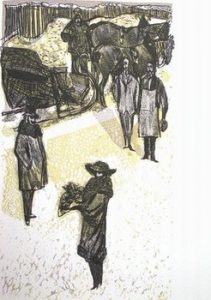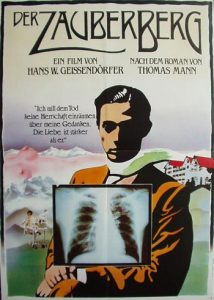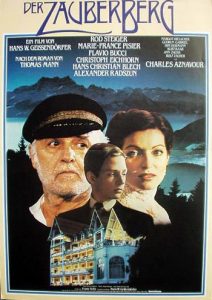The Magic Mountain – Thomas Mann – 1924


Posted by Lale on 27/4/2005, 10:50:11
The excerpts below might be interesting to note and/or discuss:
Excerpt 1: Don’t make such a fuss!
Page 53 from the marvellous John E. Woods translation:
“…She was terribly frightened, because she realized she was going to die. She was just a young girl, so it is excusable, after all. But even grown men carry on like that sometimes, which is, of course, inexcusably weak-willed of them. Behrens knows how to deal with them, he can strike just the right tone for such cases.”
“What sort of tone?” Hans Castorp asked with a scowl.
“‘Don’t make such a fuss!’ he says,” Joachim replied. “At least that’s what he said to one fellow recently–we heard about it from the head nurse who was present to help restrain the dying man. He was one of those types who makes a dreadful scene right at the end and absolutely refuses to die. And so Behrens simply dressed him down: ‘Would you please not make such a fuss,’ he said, and the patient quieted down at once and died quite peaceably.”
~
Excerpt 2: Herr Settembrini
Page 59 from the marvellous John E. Woods translation:
“Ha ha ha. What a sarcastic man you are, Herr Settembrini.”
“Sarcastic? You mean malicious. Yes, I am a little malicious,” Settembrini said. “My great worry is that I have been condemned to waste my malice on such miserable objects. I hope that you have nothing against malice, my good engineer. In my eyes it is the brightest sword that reason has against the powers of darkness and ugliness. Malice, sir, is the spirit of criticism, and criticism marks the origin of progress and enlightenment.” And all of a sudden he began to speak about Petrarch, whom he called the “Father of Modernity.”
~
Clavdia Chauchat (as illustrated by Felix Hoffmann)


Excerpt 3: Time
Page 63 from the marvellous John E. Woods translation:
“And how long does that take?” Hans Castorp turned around to ask.
Joachim raised seven fingers.
“Seven minutes must be up by now.”
Joachim shook his head. After a while he took the thermometer out of his mouth, looked at it, and said, “Yes, when you pay close attention to it –time, I mean — it goes very slowly. I truly like measuring my temperature four times a day, because it makes you notice what one minute, or even seven, actually means — especially since the seven days of a week hang so dreadfully heavy on your hands here.”
“You said ‘actually.’ But ‘actually’ doesn’t apply,” Hans Castorp responded. He was sitting with one thigh hiked up on the railing; the whites of his eyes were bloodshot. “There is nothing ‘actual’ about time. If it seems long to you, then it is long, and if it seems to pass quickly, then it’s short. But how long or how short it is in actuality, no one knows.” He was not at all used to philosophizing, and yet felt some urge to do so.
Joachim contested this. “”Why is that? No. We do measure it. We have clocks and calenders, and when a month has passed, then it’s passed– for you and me and everyone.”
“But wait,” Hans Castorp said, holding up a forefinger next to one bloodshot eye. “You said that a minute is as long as it seems to you while you’re measuring your temperature, correct?”
“A minute is as long as… it lasts, as long as it takes a second hand to complete a circle.”
“But how long that takes can vary greatly–according to how we feel it! And in point of fact. . . I repeat, in point of fact,” Hans Castorp said, pressing his forefinger so firmly against his nose that its tip was folded to one side, “that’s a matter of motion, of motion in space. But that is the same thing as trying to measure space with time–the way uneducated people do. It’s twenty hours from Hamburg to Davos–true, by train. But on foot, how far is it then? And in our minds–not even a second!”
“Listen here,” Joachim said, what’s wrong with you? I think being up here with us is getting to you.”
“Just be quiet. My mind is very clear today. So then, what is time?” Hans Castorp asked, bending the tip of his nose so forcefully to one side that it turned white and bloodless. “Will you please tell me that? We perceive space with our senses, with vision and touch. But what is the organ for our sense of time? Would you please tell me that? You see, you’re stuck. But how are we ever going to measure something about which, precisely speaking, we know nothing at all–cannot list a single one of its properties. We say time passes. Fine, let it pass for all I care. But in order to measure it. . .no, wait! In order for it to be measurable, it would have to flow evenly, but where is it written that it does that? It doesn’t do that for our conscious minds, we simply assume it does, just for the sake of convenience. And so all our measurements are merely conventions, if you please.”
~
Magic Mountain – The Movie
From http://www.deutsches-filmhaus.de/filme_einzeln/g_einzeln/geissendoerfer/zauberberg_der.htm



Excerpt 4: Mynheer Peeperkorn
Page 541 from the marvellous John E. Woods translation:
“Ladies and gentlemen. Fine. How very fine. That settles it. And yet you must keep in mind and never — not for a moment — lose sight of the fact that — but enough on that topic. What is incumbent upon me to say is not so much that, but primarily and above all this: that we are duty-bound, that we are charged with an inviolable — I repeat with all due emphasis — inviolable obligation — No! No, ladies and gentlemen, not that I — oh, how very mistaken it would be to think that I — but that settles it, ladies and gentlemen. Settles it completely. I know we are all of one mind, and so then, to the point!”
And the original:
“Meine Herrschaften. – Gut. Alles gut. Er-ledigt. Wollen Sie jedoch ins Auge fassen und nicht – keinen Augenblick – außer acht lassen, daß – Doch über diesen Punkt nichts weiter. Was auszusprechen mir obliegt, ist weniger jenes, als vor allem und einzig dies, daß wir verpflichtet sind, – daß der unverbrüchliche – ich wiederhole und lege alle Betonung auf diesen Ausdruck – der unverbrüchliche Anspruch an uns gestellt ist – – Nein! Nein, meine Herrschaften, nicht so! Nicht so, daß ich etwa – wie weit gefehlt wäre es, zu denken, daß ich – – Er-ledigt, meine Herrschaften! Vollkommen erledigt. Ich weiß uns einig in alldem, und so denn: zur Sache!”
~
Seance in Magic Mountain – Posted by Steven Davis
I read Magic Mountain about a year ago and consider it one of the greatest novels I have read. However, the seance episode puzzles me. Did Mann believe in such things? Is he precipitating his characters into a collective delusion? Or is he withdrawing to a purely symbolic layer? It seems so out of step with the carefully crafted reality of the rest of the novel.
~
Posted by Lale on 14/4/2005, 10:07:13
: seance episode puzzles me. Did Mann believe in such
: things? Is he precipitating his characters into a
: collective delusion? or is he withdrawing to a purely
: symbolic layer? It seems so out of step with the
: carefully crafted reality of the rest of the novel.
Steven,
After having read it… yes… I am as confused as you are. When I was reading this part it was like I was reading a different novel. A complete departure from the rest of the book which was firmly rooted in this-wordly reality. I am cery surprised. I don’t know what to make of it. And at the very end too. Why did he have to do this? It sort of ruins the magnificence of the book.
Your questions are my questions as well and I hope someone can provide some logical explanations.
1. Did Mann believe in such things? (Seems so unlikely but one never knows I guess)
2. Is he precipitating his characters into a collective delusion?
3. Does he switch to a purely symbolic layer? (Somehow this seems unlikely too since in the previous 600 pages he takes pains in deciphering all the symbolisms.)
Very unsettling,
Lale
~
Posted by LadyPurple on 15/4/2005, 11:02:41
Lale and Steven,
I did some research into this question – I have not reached that part in the book yet, however, some interesting pieces of information have come to light.
Occultism was quite the rave in the early 20s. Thomas Mann himself attended a seance in 1923 and wrote a short piece about his experience (actually he was nauseous at the end of the seance). He saw the phenomenon 1) as a fashion of middle class society and 2) as a likely entertainment for the sort of people hanging out at the Sanatorium.
He also saw it as a reflection of the political conditions in Germany at the time – e.g. there were left-wing and right-wing mediums and seances…
He also admitted that, even though one does not believe in certain occult things they draw you in..
I trust this helps.
The discussion on the wider issue of occultism, satanism etc. expands the topic – when you are ready for it…
Friederike
~
Posted by Lale on 15/4/2005, 11:23:49
Friederike, thank you, that definitely helps. Yes, it would be a fun way to pass time for people in a sanatorium, especially since it was “in” at the time. My confusion comes from the narration which seems to relay the supernatural happenings as if they really did happen, or at least witnessed by more than one person. So, it was not just one person seeing illusions but it was a common perception, with supporting evidence. We’ll talk more when you read that part.
Where are you, by the way? Will you be able to finish it and discuss it with us before you embark on your European trip?
I got a letter from Hanh. The good news is: She is reading Magic Mountain. The bad news is: She is still reading it.
Lale
~
Posted by Steven Davis on 15/4/2005, 21:50:21
Thanks for the research, Friederike. We probably expect too much of the authors we admire, but they are still the creatures of their time. Nonetheless, one would expect, given Mann’s insight into his characters’ longing to escape into false reality, that he would have been more of a skeptic himself. And maybe he was, but he knew his readership would accept the scene, given the environment you have described.
It’s interesting that we don’t worry about whether Shakespeare or Dickens believed in ghosts, but accept their plot devices for what they are. What makes Magic Mountain different, I suppose, is that, while there are many symbolic aspects to the work, it is also utterly believable at face value (at least up to the seance). We recognize the seductive power of the sanitarium’s routine, and we can see ourselves abandoning our responsibilities, surrendering our will, and being drawn into its cocoon as Hans was.
Steven
~
Posted by Lale on 16/4/2005, 9:20:20
: We recognize the seductive power of the
: sanitarium’s routine, and we can see ourselves
: abandoning our responsibilities, surrendering our
: will, and being drawn into its cocoon as Hans was.
I am glad to hear that this is a common sentiment. I certainly felt that way. It is very tempting to live a life isolated from the real world’s problems, to eat great food five times a day, to walk on the mountains, to watch the sky from your “splendid lounge chair” …
I was envious of Hans Castorp when he was studying medicine in his balcony. Such indulgence! Learning for the sake of learning, having nothing else to do but to dedicate yourself to the object of your curiosity…
Maybe other people, people who are less “bookish” than ourselves would not want to spend extended amounts of time in such a place. They would be less willing to give up the hustle and bustle of real life. But for people who read a lot (and reading is still a solitary activity), it is very tempting to be in an all-inclusive, all-expenses-paid luxury resort to just sit and read all day.
There is so much to talk about. Let’s give Friederike a little time to move further in the book. Then we can start serious talk, even if it’s during Friederike’s absence, she won’t be gone for long.
Lale
~
Posted by Steven on 16/4/2005, 18:28:43
[I’ll drop the surname in my postings, since there don’t seem to be any other Stevens in the group — Oh, the curse of a common name!]
: Maybe other people, people who are less
: “bookish” than ourselves…
This reminds me to recommend a Thomas Mann short story I read when I was in college. “Tonio Kroger” portrays a young man who finds that his artistic temperament makes him an outsider. He envies the popularity and happiness of other youths and longs for their innocent contentment, but must come to terms with being forever above and apart.
~
Posted by LadyPurple on 16/4/2005, 22:46:38
Hi Steven,
I am glad you mention Tonio Kroeger! We read it in school – probably too early to appreciate it fully. Still, it is a good precursor.
For both you and Lale,
I read a very interesting paper (unfortunately in German) about Thomas Mann’s exploration of the occult in MM. Even though I haven’t read that far in MM, I can see the analysis being very interesting.
To give you a taste, the author (who claims to have read MM at least 20 times – in English, he regrets) notes that we tend to forget why it is “Magic” Mountain – the satanic aspect of many of the main characters, the porter at the station when Hans arrives, drags his foot ( a symbol of Satan in literature – e.g. Mephisto in Goethe’s Faust)…
It is true that on the first round of reading one does not pick up these nuances necessarily. So, the seance falls within this context – not that Mann believed in it, but he felt it to be a topic worth exploring in depth. I can’t tell at this time whether his tone is ironic and satirical – I have to read the passage first. But I do find in the Woods translation that some nuances are missing.
Friederike
~
don’t forget – Posted by joffre on 16/4/2005, 13:01:02
Now that you’ve finished ‘The Magic Mountain’, go back to ‘Life: A User’s Manual’ page 445 and tell me who you find there.
As I said before, if you happen not to have the Godine edition, the paragraph you want is in Cyrille Altamont’s letter to his wife, just after the bit about the donkey’s tail barometer.
~
The French Connection – Posted by Lale on 16/4/2005
Connecting The Magic Mountain with Georges Perec’s La Vie mode d’emploi.
Great find, Joffre. Mynheer Peeperkorn and Clavdia are in Life: A User’s Manual
Life, A User’s Manual
Georges Perec
Translated by David Bellos
DRG (Godine)
Page 445
The pub was packed. In the end I found a seat at a table partly occupied by an amazing couple: an enormously corpulent man, getting on in years, with a high forehead and a great mop of white hair hanging like a cloud over his powerful head, and a thirty-year-old woman with a look that was both Slav and Asiatic at the same time – broad cheekbones, narrow eyes, reddish fair hair plaited and wound around her head. She said nothing and frequently placed her hand on her companion’s as if to stop him getting angry. He spoke incessantly with a slight accent I couldn’t place; he didn’t finish his sentences but broke them off all the time with “all in all”, “well”, “fine”, “excellent”, without ceasing for a moment to down huge quantities of food and drink, getting up every five minutes to make his way to the bar to fetch platefuls of sandwiches, packets of crisps, sausages, hot pies, pickles, apple pies, and pints and pints of brown ale which he drank in a single gulp.


Read both of these great books! The Magic Mountain – Life A User’s Manual
Posted by joffre on 16/4/2005, 21:18:07
I think this is great. It’s one of the things I used to imagine doing in a novel when I thought more about writing. I wonder how many more there are in Life: A User’s Manual. if anyone suspects anything, let me know. There might be clues. ‘The Magic Mountain’ is mentioned by title in Life: A User’s Manual. Not all characters are so distinct as Mynheer Peeperkorn though, and without Clavdia at his side, even he might be questionable. As it is, I don’t think anyone can doubt who was meant.
@
Posted by Lale on 25/4/2005, 9:40:05
I think we can start talking about this book a in a more orderly fashion. There is a couple of us who haven’t finished yet but can catch up with the talks later on. (Warning: Possible Spoilers – Read at your own risk)
I thought the book was a true masterpiece and I feel that this is the general sentiment here.
I loved the inexperienced and innocent ponderings of Hans Castorp. I loved it when the two cousins’ discussions when one of them introduced a thought and the other was incredulous. I think the first one was with the thermometer and seven minutes:
Joachim – I truly like measuring my temperature four times a day, because it makes you notice what one minute, or even seven, actually means.
Hans Castorp – You said ‘actually.’ But ‘actually’ doesn’t apply, there is nothing ‘actual’ about time. If it seems long to you, then it is long, and if it seems to pass quickly, then it’s short. But how long or how short it is in actuality, no one knows.
The discussions between Herr Settembrini and Herr Naphta were too fast for me. I had a hard time following them.
Also, the endlessness of their back-and-forth reminded me some of the discussions I were trapped in. In real life, I don’t like it when people extend arguments just for the sake of arguing and when they don’t know how to put an end to it. Reading the exchanges of Settembrini and Naphta, I felt I was in one of those real-life arguments when the other party won’t take “let’s just agree to disagree and move on” for an answer. They just want to go on forever.
Of course Settembrini and Naphta were playing to an audience, they wanted to influence “impressionable youths”.
Anyway, their discussions were hard to follow and at times, I didn’t know who was saying what. I thought Clavdia was a mystery. We didn’t really get to know her. Who is she, what does she want, what makes her angry and what makes her happy… Very little of her was revealed to us.
What did you think of Hans Castorp’s passion for Clavdia? It was a cool, calm kind of passion, wasn’t it?
I have so many questions, there is so much to talk about. Why did Mynheer Peeperkorn do what he did? He must have planned it, in detail, long time ago.
The end Settembrini-Naphta relationship came to, was that inevitable?
Many more questions. Please jump in here with your comments and questions, and help me form my thoughts and my questions.
Great book. Made a huge impression on me.
Lale
~
Time-Space – Posted by Lale on 25/4/2005, 10:08:17
Magic Mountain was written in 1924. Einstein had already won the Nobel prize at this time. I am convinced that Thomas Mann read at least some of Einstein’s papers and must have been very interested in the time-space concepts. He often uses time and space in the same breath and ponders about their connection.
Lale
~
Posted by Paul L on 26/4/2005, 7:33:11
Time as a psychological concept has always interest me. There is a wonderful, if short, article titled “Nobel Prize Authors on Time” which can be found on the Nobel site.
To follow up Lale’s comment, the concept of time (and its relationship to space) was getting a lot of attention during the early 20th century- no doubt in large part due to Einstein (also see Yourgrau’s ‘A World Without Time: The Forgotten Legacy of Godel and Einstein’). However, one can also differentiate between experiential and existential time. And so we also have William James and Henri Bergson, to name but a couple. I feel that Mann was more concerned with experiential time- but it has been a while since I have read it.
Margaret Church, in her ‘Time and Reality: Studies in Contemporary Fiction’ includes a chapter titled “Thomas Mann: The Circle of Time” if anyone is interested.
~
Posted by joffre on 25/4/2005, 18:05:33
I wondered at the linking of Clavdia and the Hippe boy from Castorp’s youth or childhood. Just a couple weeks ago, I reread Hesse’s ‘Steppenwolf’ and noticed that Hesse does the same thing with Harry Haller. Harry guesses that the girl’s name is Hermine because she reminds him of some Herman from his youth. I know that Mann and Hesse knew each other, and ‘The Magic Mountain’ is only three years older than ‘Steppenwolf’. I’m not sure how pertinent all that is. I just found the linking curious in each case.
~
Hans and Clavdia – Posted by Steven on 26/4/2005, 8:55:28
: What did you think of Hans Castorp’s passion for
: Clavdia? It was a cool, calm kind of passion, wasn’t it?
I would call Hans’s feeling for Clavida an elective obsession. Initially repulsed by her slamming of the door and her commonness, he chose to fall in love with her in much the same way that he chose to be sick and become a resident of the sanitarium.
There is often a perverseness in human relationships which makes people love most those who are least likely to return their love, sometimes with self-destructive consequences. We see this many, many times in literature, with Maugham’s Of Human Bondage being one of the best known recent examples.
I think Mann is trying to explain such relationships by showing one developing in parallel to Hans’s physical and social dependency on the sanitarium. Hans coolly and calmly, as you say, sets about falling in love. By choosing someone whose passion won’t match his own, he is deliberately surrendering control of their relationship. He isn’t so much in love with Clavdia as he is frightened of his own free will — not a flattering view of human nature!
Steven
~
Posted by Lale on 27/4/2005, 8:55:55
: he chose to fall in love with
: her in much the same way that he chose to be sick and
: become a resident of the sanitarium.
Steven, this makes so much sense. Yes, I think he did choose to fall in love with her.
Did Hans castorp feel any guilt?
Was he really truly happy there at the sanatorium, completely in peace with himself, or was he at the same time being eaten by guilt for not doing what was expected of him? Did he have a duty? For that matter, did Joachim have a duty?
Hans took great pleasure in “defeating” the purpose of his uncle’s visit. That amused me. I was on his side, I wanted the uncle to see defeated. But also there were parts of me saying “Hans, that’s a dead end, get out of there.”
I must say, the life at Magic Mountain is very tempting. I wished I lived there and I was willing to have a little temperature, a moist spot to justify my stay. What else can you ask for? Good food five times a day, pure air, luxury hotel … You walk, you rest, you read. It is like Club Med. On the Alps. You can call it Club Alps.
But then, by the time the gramophone arrived, you could feel Hans Castorp’s boredom. At that time I wanted him to move on. Go, you did everything you can do here. But in spite of his boredom he couldn’t move.
Steven, when you say “he is frightened of his own free will”, what do you mean, can you expound on that a little more. When he got bored he should have left. He didn’t. He waited for the war to make him go back. He needed a good reason or an obligation. Or even maybe he needed the place to completely fall apart before he could leave.
What was he afraid of? I know real life is frightening. Most of us don’t realize that because we don’t get to experience such a life as in Berghof. I am sure after living there for a couple of years it would be very hard to go back.
Lale
~
Is it undignified to make a fuss on our way out? – Posted by Lale on 27/4/2005, 9:02:56
And is the doctor justified in telling us to behave ourselves? How much compassion is a health care giver should have/show if any?
“…She was terribly frightened, because she realized she was going to die. She was just a young girl, so it is excusable, after all. But even grown men carry on like that sometimes, which is, of course, inexcusably weak-willed of them. Behrens knows how to deal with them, he can strike just the right tone for such cases.”
“What sort of tone?” Hans Castorp asked with a scowl.
“‘Don’t make such a fuss!’ he says,” Joachim replied. “At least that’s what he said to one fellow recently–we heard about it from the head nurse who was present to help restrain the dying man. He was one of those types who makes a dreadful scene right at the end and absolutely refuses to die. And so Behrens simply dressed him down: ‘Would you please not make such a fuss,’ he said, and the patient quieted down at once and died quite peaceably.”
What did you think of this? I don’t think this makes Behrens a monster but still, did he have to say it? Did it serve any purpose?
Lale
~
Posted by Lale on 27/4/2005, 9:20:55
‘”Sarcastic” You mean malicious. Yes, I am a little malicious,’ Settembrini said. ‘My great worry is that I have been condemned to waste my malice on such miserable objects. I hope that you have nothing against malice, my good engineer. In my eyes it is the brightest sword that reason has against the powers of darkness and ugliness. Malice, sir, is the spirit of criticism, and criticism marks the origin of progress and enlightenment.’ And all of a sudden he began to speak about Petrarch, whom he called the “Father of Modernity.”
Do you agree that malice leads to progress and enlightenment?
Did you like Herr Settembrini?

Posted by Lale on 27/4/2005, 9:33:44
[with respect to Clavdia’s physique] The effect was not “beautiful” at all; but it was what it was, and when a man is in love his aesthetic opinions are no more valid than his moral judgements.
~
Sick and Stupid – Posted by Lale on 27/4/2005, 9:28:07
That is so strange — sick and stupid. I don’t know whether I’m putting it quite right, but it seems to me very peculiar for someone to be stupid and sick besides, and when the two are joined it’s surely the most pitiful thing in the world. … One assumes stupid people must be healthy and vulgar, and that illness must ennoble people and make them wise and special.
Hans Castorp concludes this line of thought with “At least that’s what one normally thinks, is it not?”
What do you think of this idea, should illness be exclusive to the smart?
~
Posted by Steven on 27/4/2005, 14:48:22
Hans was probably most on the mark when he said “I don’t know whether I’m putting it quite right.” In a single sentence he reverses the cause and effect relationship between health and intelligence.
: One assumes stupid people must be healthy and vulgar, and that
: illness must ennoble people and make them wise and special.
I don’t think he’s trying to say that only smart people get sick, but that somehow being sick can make a stupid person wise.
We do like to think that a person facing death will reflect upon his or her life, strip away all falsehoods and pretense, and leave some profound message for those gathered round the sick bed. We tend, especially in some cultures, to think that being old makes one automatically wise as well. It’s interesting how imagery reinforces this. We think of a heavily lined, sad face as being “thoughtful.” A cheerful smile is more likely to be described as “vacuous.” So people who look sick, look wise.
It’s a pretty theory — that the mind’s light burns brightest just before it expires — but not true in my experience.
As to the other interpretation of what Hans says — that wise people are more inclined to be ill — we do see a lot of sickly aristocrats and stout peasants in our reading, don’t we? Intelligence and breeding supposedly make one sensitive, which somehow translates to being more succeptible to disease.
Either way you look at it — “I’m smart, therefore I’m sick,” or “I’m sick, therefore I’m smart” — it’s just a self-serving observation on Hans’s part to justify his hypochondria.
~
Posted by Lale on 27/4/2005, 10:03:58
Herr Settembrini on Asia/Asians (time and land):
This liberality, the barbaric extravagance in the use of time is the Asian style — that may be the reason why the children of the East feel so at home here. Have you never noticed that when a Russian says ‘four hours’ it means no more to him than ‘one hour’ does to us? The idea comes easily to mind that the nonchalance with which these people treat time has something to do with the savage expanse of their land. Toomuch room — too much time. It has been said that they are a nation with time on their hands — they can afford to wait. We Europeans can’t wait. We have just as little time as our noble. tidily segmented continent has space …
Well.
Of course Herr S. is using the name Asia losely, Japan for instance cannot be included in this argument since it has small land and it is always pressed for time.
The idea, the relevance of land to time and land/time to culture, is interesting. In France, people who wait at the check-out lane in the supermarket are very impatient, almost angry. Fidgeting, talking to themselves in frustration, and even trying to “cheat” for a spot further down the queue. In Canada, everyone waits calmly for their turn. No one complains out loud and no one shows visible signs of impatience. In France all the drivers are in a hurry, they cannot afford to let another car get in front of them. In Canada everyone politely offers the road to the other drivers.
Lale
~
Posted by Steven on 28/4/2005, 14:37:55
Lale, this is very interesting. Here in the US the people in the South and West, where there is more space, have a reputation for being slower, more patient, and more courteous. In my travels to the Northeast (and in speaking to people from that region who come here) there is some truth to the stereotype. The differences are much as you’ve observed between France and Canada, only not quite so marked. I wonder if the same comparison can be made between crowded England and spacious Australia?
~
Posted by Guillermo Maynez on 4/5/2005, 12:41:54
Well, Mexico is kind of big (much bigger than any European country), but Mexico City is different from other towns, surely because it is crowded and packed. I grew up in a middle-sized town in Northern Mexico, a land much like Southern and Western US in terms of spaciousness. And… it’s true! People in the provinces are more patient, more amiable. Waiters take longer to bring your food, while you have a drink, there is more space on the streets. Here in Mexico City it’s horrible. People do show impatience at supermarket lanes (and I’m one of the worst), and street-manners barely exist. Mexico City is neurotic and hysterical and get me out of here back to the desert.
~
Expense – Posted by Lale on 27/4/2005, 10:26:25
The death of the Austrian horseman (pg. 286 in John E. Woods translation):
True, for days he had kept himself going only with the massive amounts of oxygen; had used forty demijohns yesterday alone, at six francs a bottle. That must have run into some money, as the gentlemen could well imagine, especially since his wife, in whose arms he had passed away, had been left quite penniless. Joachim expressed disapproval of such expense. What was the point of these tortures, of clinging to life in such an expensive, artificial way, when the case was hopeless? One could not blame the man for blindly consuming expensive gas keeping him alive, when they had forced it on him. But those treating him ought to have acted more reasonably and have let him walk the inevitable path, for God’s sake — regardless of the question of resources, or better, with considerable regard to them. The living had their rights too, and so on. Hans Castorp disputed this emphatically — his cousin was talking almost like Settembrini, with no respect or reverence for suffering. The horseman had died in the end, and there was nothing funny about that; you could only show your concern, and a dying man deserved every kindness, every honor that could be bestowed on him, Hans Castorp insisted on that. He could only hope Behrens had not screamed at the end and scolded him irreverently — ha hadn’t had he? No need to worry, Nurse Schildknecht declared. The horseman had made only one small, imprudent attempt to escape at the very end, by trying to jump out of bed; but a gentle reminder of the pointlessness of his intention had sufficed to keep him from attempting anything of the sort again.
~
Posted by joffre on 29/4/2005, 13:07:44
There are, I think, more reasons to like the look of something than it’s being beautiful. I once found myself terribly attracted to a girl I initially found very ugly, and I didn’t know anymore about her than what she looked like. One day when I was not around her, I realized I was thinking about her. It was rather shocking.
I think aesthetic philosophy is interesting, but I’ve not read much. I don’t read much philosophy in general. I like to read overviews of it sometimes. I once read or heard a little anecdote about Samuel Coleridge. He was looking at some site or other. There was a rustic fellow standing next to him. The fellow said, ‘It’s majestic, isn’t it?’ Coleridge said, ‘Yes, yes, that’s just what it is.’ The man then added, ‘beautiful and sublime’. And Coleridge went and told the Wordsworths and they all laughed at the fellow’s ignorance.
~
Posted by Steven on 28/4/2005, 8:30:56
: Steven, when you say “he is frightened of his own free will”, what do you mean, can you
: expound on that a little more. When he got bored he should have left. He didn’t.
: He waited for the war to make him go back. He needed a good reason or an obligation.
: Or even maybe he needed the place to completely fall apart before he could leave.
:
: What was he afraid of? I know real life is frightening. Most of us don’t realize that
: because we don’t get to experience such a life as in Berghof. I am sure after living
: there for a couple of years it would be very hard to go back.
Lale,
I think Hans was afraid to run his own life. He’s just out of school, without close family, financially independent, and able to do anything he pleases. He’s as free as anyone can possibly be, yet he eagerly places himself into an environment where every decision is made for him. He isn’t running away from anyone or any thing, only from the responsibility that comes with independence. When he finally leaves the Berghof, it’s to join the army — another place where someone else will take charge of every last detail of his life.
Most of us probably find ourselves daily in situations where we are glad to have others make decisions for us — what restaurant to go to, what movie to see, even (gulp) what book to read next — and we gladly accept less than what we want rather than bear the burden of making a bad choice. I think we would all feel the temptation of the Magic Mountain.
I don’t know if Mann intended his novel as a cautionary tale for us at the individual level or as a society, but, to me, it speaks on both levels: The individual who fears to exercise his free will becomes detached from reality and fails to fulfill himself. The society which fears to take responsibility for its own condition falls prey to totalitarianism.
~
Posted by len. on 29/4/2005, 13:24:59
Lale asks:
>What did you think of this? I don’t think this makes Behrens a monster but still, did he have to say it? Did it serve any purpose?
No, but then again, neither does complaining about or struggling against one’s imminent death. It’s not so much about being brave or whatever, it’s just that it’s completely pointless, and whatever satisfaction it offers the complainer is at the considerable expense of those attending.
Note that I’m not arguing for defeatism. When death is not in fact inevitable, marshalling whatever strength you have to avoid it is of course the only sensible thing to do, but that still doesn’t warrant “making a scene”.
len.
@
Posted by len. on 29/4/2005, 13:28:24, in reply to “Sick and Stupid”
Lale asks:
> should illness be exclusive to the smart?
Utter codswallop. Regardless of the intention of the words, however garbled.
Two completely uncorrelated parameters of life.
len.

Posted by joffre on 29/4/2005, 16:14:24
I agree and yet, I don’t think any of us can know how we’ll face the moment of death. Can death ever be real to us until that moment? I hate being alive, but I can’t feel sure that being dead is better. For me, this is The Trouble With Being Born (E. M. Cioran). Anyone else read that? I didn’t find it especially interesting, but the title appeals greatly to me. I also enjoy the coincidence of it’s being published in the year of my birth.
I still like to think, of course, that I’ll die with dignity, but who knows?
~
Posted by Lale on 29/4/2005, 16:30:38
: I still like to think, of course, that i’ll die with dignity, but who knows?
Because this (to die with dignity) is an obsession of mine, I am pretty sure that it won’t happen.
I try to take all the precautions. I inform my close friends and family members of how to “proceed” once I’m devoid of all dignity, I write myself letters to read at my old age …
But when you fear something so much, it is sure to happen.
I agree that we cannot know how we will behave.
Lale
~
Posted by joffre on 1/5/2005, 22:52:11
I think Castorp just feels that the situation is aesthetically bad. It kind of reminds me of Wilde’s quip, ‘losing one parent is a tragedy; losing both looks like carelessness.’ I don’t think anyone ‘normally’ thinks of this, but I can understand feeling that being sick and stupid is rather too much.

Posted by Steven on 3/5/2005, 11:33:34
: Do you agree that malice leads to progress and enlightenment?
No, certainly not in the sense Settembrini is casting it. Malice is ill-will without reason, so it can’t possibly be “the brightest sword that reason possesses.” I wonder if this is a faithful translation — does anyone with access to the German text have any thoughts?
I suppose malice can lead to progress in the same sense that a disastrous fire or earthquake can lead to urban renewal — we can appreciate the end result, but it would never justify the means.
: Did you like Herr Settembrini?
Aside from the above, yes, I found him the most (almost the only) likeable character in the novel, though best taken in small doses because of his intensity.
~
Posted by Lale on 3/5/2005, 11:37:11
Friederike has the German copy and she is reading the book in both languages. She says the original is 300 pages longer than the English rendition.
Lale

Posted by Guillermo Maynez on 4/5/2005, 12:25:50
: Do you agree that malice leads to progress and
: enlightenment?
:
: Did you like Herr Settembrini?
:
I do like Settembrini a lot. He is an intelligent man and I love every word he says whether I agree with him or not. Settembrini embodies the spirit of liberalism, democracy and progress, and I think Mann makes him naïve in order to show that sometimes liberals, democrats and progressive people are very naïve in their faith in us humans, in their idea that there lies a luminous future ahead if only…
On the other hand, Naphta embodies the spirit of obscurantism, of Communism, of Realpolitiks and the Inquisition. Never optimistic (despite their rhetoric), always bitter deep inside. Naphta makes a lot of bitter fun out of poor Settembrini, and sometimes Naphta is right in what he says. But I rooted for the Italian all the time.
~
Posted by Guillermo Maynez on 4/5/2005, 12:30:22
Absolutely agree with len: sickness and intelligence are completely uncorrelated. But the idea is fun to examine. You could even think it otherwise: if you’re ill, you can’t think straight, while if you are healthy, you are in possession of your full powers.
~
Posted by Guillermo Maynez on 4/5/2005, 12:35:20
Absolutely agree: when a person (not just men) is in love, he or she will justify all the actions of their beloved and find them beautiful. We all know that handsome young man who had a lot of success with the ladies and who ended up in love with an ugly girl, and not for interest (money, etc.) And look at the girlfriends of drug dealers and other assorted guys who beat them, and still they love them.

A Christian reverence for misery
Page 442 from the marvellous John E. Woods translation:
A squalid view of things, Settembrini asserted, and he felt himself almost above combating such an attitude. For the notion of a sanctified state or what the engineer had called Christian reverence for misery — though the phrase was surely not his own — was a fraud based on deception, on misplaced feelings, on a psychological blunder. The sympathy that the healthy person felt for someone who was ill, which could intensify to the oint of awe, since he was unable to imagine how he could ever bear such suffering himself — such sympathy was utterly exaggerated. The sick person had no right to it. It was based on a misperception, a failure of imagination, because the healthy person was attributing his own mode of experience to the sick person, making of him, so to speak, a healthy person who had to bear the torments of sickness — a totally erroneous idea. The sick person was just that, sick, both by nature and in his mode of experience. Illness battered its victim until they got along with one another: the senses were diminished, there were lapses in consciousness, a merciful self-narcosis set in — all means by which nature allowed the organism to find relief, to mentally and morally to its condition, and which the healthy person naively forgot to take into account. …
@
Posted by Steven on 3/5/2005, 9:41:32
: Illness battered its victim until they got along with one
: another: the senses were diminished, there were lapses
: in consciousness, a merciful self-narcosis set in —
: all means by which nature allowed the organism to find
: relief, to mentally and morally to its condition, and
: which the healthy person naively forgot to take into account. …
Having had a bit more than my share of major illnesses and injuries, I can say that this is absolutely true. After the first few hours the body does numb its own pain. Over the longer term, the body comes to terms with its new limitations and enters a zone of relative comfort. The problem is that, to promote proper healing, you must push back against those limits, enduring fresh pain. Medical science now knows this, and the “tough love” approach (e.g. forcing patients to stand up only hours after a major operation) has done much to promote full and fast recoveries.
~
Posted by Lale on 3/5/2005, 10:44:43
: After the first few hours the body does numb its own
: pain. Over the longer term, the body comes to terms
: with its new limitations and enters a zone of relative
: comfort.
I agree. I’ve experienced that too. To the healthy, it looks impossible what the sick is going through, and yet they somehow go through it.
Steven, I hope all your illnesses and injuries are in the past now.
Lale
~
Beautiful woodcuts of The Magic Mountain.
http://www.pmannia.com/2011/04/zauberberg-woodcuts-to-thomas-manns.html
















